|
|
|
Sort Order |
|
|
|
Items / Page
|
|
|
|
|
|
|
| Srl | Item |
| 1 |
ID:
123992


|
|
|
|
|
| Publication |
2013.
|
| Summary/Abstract |
This article analyses frictions in strengthening civil society (CS) for peacebuilding. It argues that frictions are caused by the fact that policies for CS support in post-conflict settings are rooted in a Western discourse on the role of civic actors in politics and society. Consequently, intervention practices do not match local practices of civil society in non-Western, conflict-affected countries. In trying to locate suitable local counterparts, intervening international non-governmental organizations (INGOs) struggle to reconcile criteria of 'international legitimacy' (based on values of inclusivity, tolerance and non-violence) and 'local legitimacy' (local support and roots). The frictions to which this leads are illustrated with case studies from our research over the past years. They show that when intervention models based on such discourses meet realities on the ground, there is often some margin for action and space for negotiation on both sides. In two cases, this led to unexpected outcomes, which were not necessarily negative from the perspective of peacebuilding. However, friction does not always yield unexpected or positive outcomes. In the third case, it led merely to an imposition of norms on the part of intervening INGOs.
|
|
|
|
|
|
|
|
|
|
|
|
|
|
|
|
| 2 |
ID:
123994
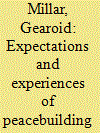

|
|
|
|
|
| Publication |
2013.
|
| Summary/Abstract |
This article investigates local experiences of the Truth and Reconciliation Commission for Sierra Leone and explains how these experiences were influenced by the parallel administration of many peacebuilding processes. Using qualitative data it shows how the goals and procedures of these various processes overlapped and interacted in the imaginations of local people, generated unpredicted expectations, and eventually led to negative experiences of the Commission's work. I describe how Tsing's idea of 'friction' can helpfully explain local experiences of peacebuilding and the new concept of 'compound friction' is introduced as a tool for understanding the local impacts of parallel peacebuilding processes.
|
|
|
|
|
|
|
|
|
|
|
|
|
|
|
|
| 3 |
ID:
123991
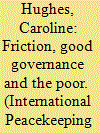

|
|
|
|
|
| Publication |
2013.
|
| Summary/Abstract |
Friction is a zone of contingency where creative responses of local and international agents produce unexpected effects. Viewing 'good governance' in this light allows better appreciation of the blurring of boundaries between international prescriptions and local cultures, often regarded as antithetical in the Cambodian case. In fact, actors in Cambodia mobilize both a newly invigorated domestic cultural discourse and international ways of working to pursue struggles over development in the post-conflict context. However, elite actors are much better placed to do this successfully than are the poor.
|
|
|
|
|
|
|
|
|
|
|
|
|
|
|
|
| 4 |
ID:
123993
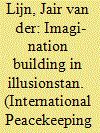

|
|
|
|
|
| Publication |
2013.
|
| Summary/Abstract |
A variety of international actors, such as the UN and NATO, intervene in complex environments, such as Afghanistan. In order to overcome complexity and for 'us' to deal with 'them', constructs such as 'the insurgents' and 'the government' are used to help 'our' understanding and to simplify the picture. Subsequently, these constructs become subject to nation building and counterinsurgency theories applied by the 'international community'. Many of these are suboptimal because their subjects were constructs in the first place. The result is a shadow boxing match, in which international policies dissolve in local realities. On the basis of social psychology theories, this paper develops the hypothesis that in complex peacebuilding environments decision-makers structure and simplify disorder, which leads to suboptimal interventions, to which local actors respond in a process of friction. This hypothesis is tested on the case of Afghanistan.
|
|
|
|
|
|
|
|
|
|
|
|
|
|
|
|
| 5 |
ID:
123995
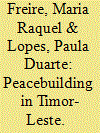

|
|
|
|
|
| Publication |
2013.
|
| Summary/Abstract |
This article highlights the importance of interaction between peace missions and local dynamics, drawing on Tsing's work on frictions. It is centred on the United Nations (UN) peace intervention in Timor-Leste, discussing different examples of frictions, which have the potential to undermine or empower the peacebuilding efforts underway. The analysis stresses the unpredictable effects of applying the UN liberal peace model. It is argued that processes of friction, often consisting of an incremental build-up of intermediate results shape and form the (un)sustainability of any peacebuilding process initiated by an external intervention and, consequently, should be identified and analysed in order to enhance or minimize their positive/negative contribution towards building peace.
|
|
|
|
|
|
|
|
|
|
|
|
|
|
|
|
| 6 |
ID:
123990
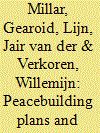

|
|
|
|
|
| Publication |
2013.
|
| Summary/Abstract |
What happens when global meets local? This special issue focuses on the dynamic interaction between externally conceived plans for peacebuilding intervention and local people's own approaches and strategies. The notion of 'friction' provides a perspective that acknowledges the unpredictable and unexpected nature of this interaction. The 'hybrid' outcomes of such dynamic interactions can vary in extent and success, as peacebuilding plans are rerouted and redesigned in practice. This special issue explores how, why, and to what effect internationally designed, funded, or administered peace projects interact with and/or are appropriated by local actors.
|
|
|
|
|
|
|
|
|
|
|
|
|
|
|
|
| 7 |
ID:
123996
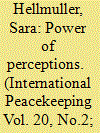

|
|
|
|
|
| Publication |
2013.
|
| Summary/Abstract |
Perceptions of peace and conflict differ among various actors. Exploring them can enhance our understanding of meanings that international and local actors ascribe to a conflict, and what strategies are chosen to respond to it. Drawing on academic literature and empirical data gathered in the Democratic Republic of Congo (DRC), this article analyses how perceptions of the conflict in the DRC influenced the different local and international peacebuilding strategies and the outcomes of their interaction. The international community's priority was the restoration of the state because they saw the conflict as a breakdown of authority at the national level. The liberal state that the international community had foreseen was however hybridized with local authority structures in the course of its interaction with local perceptions and experiences. At the same time, international strategies eschewed or only belatedly included local priorities, such as reconciliation between antagonistic communities and land conflicts. The article thus argues that the interplay of priorities - the space where friction occurs - remains dominated by international actors. As a consequence, it suggests exploring more carefully and pragmatically the potential intermediary role that local peacebuilding actors can play in rendering international strategies more relevant at the local level.
|
|
|
|
|
|
|
|
|
|
|
|
|
|
|
|
| 8 |
ID:
123997
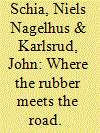

|
|
|
|
|
| Publication |
2013.
|
| Summary/Abstract |
Peacebuilding actors have been heavily criticized for being postcolonial, orientalist and mired in a Western rationality, causing a gap between needs on the ground and the means provided, and resulting in poor delivery. From recent fieldwork in Liberia, Haiti and South Sudan we argue that while there is merit to much of this critique, there is also a will to analyse and understand the local political economy and how international actors become a part of it, but that peacebuilding tends to fall victim to conflicting power structures within the UN and between international actors, as well as to the lack of application of acquired knowledge and cumbersome processes.
|
|
|
|
|
|
|
|
|
|
|
|
|
|
|
|
|
|
|
|
|